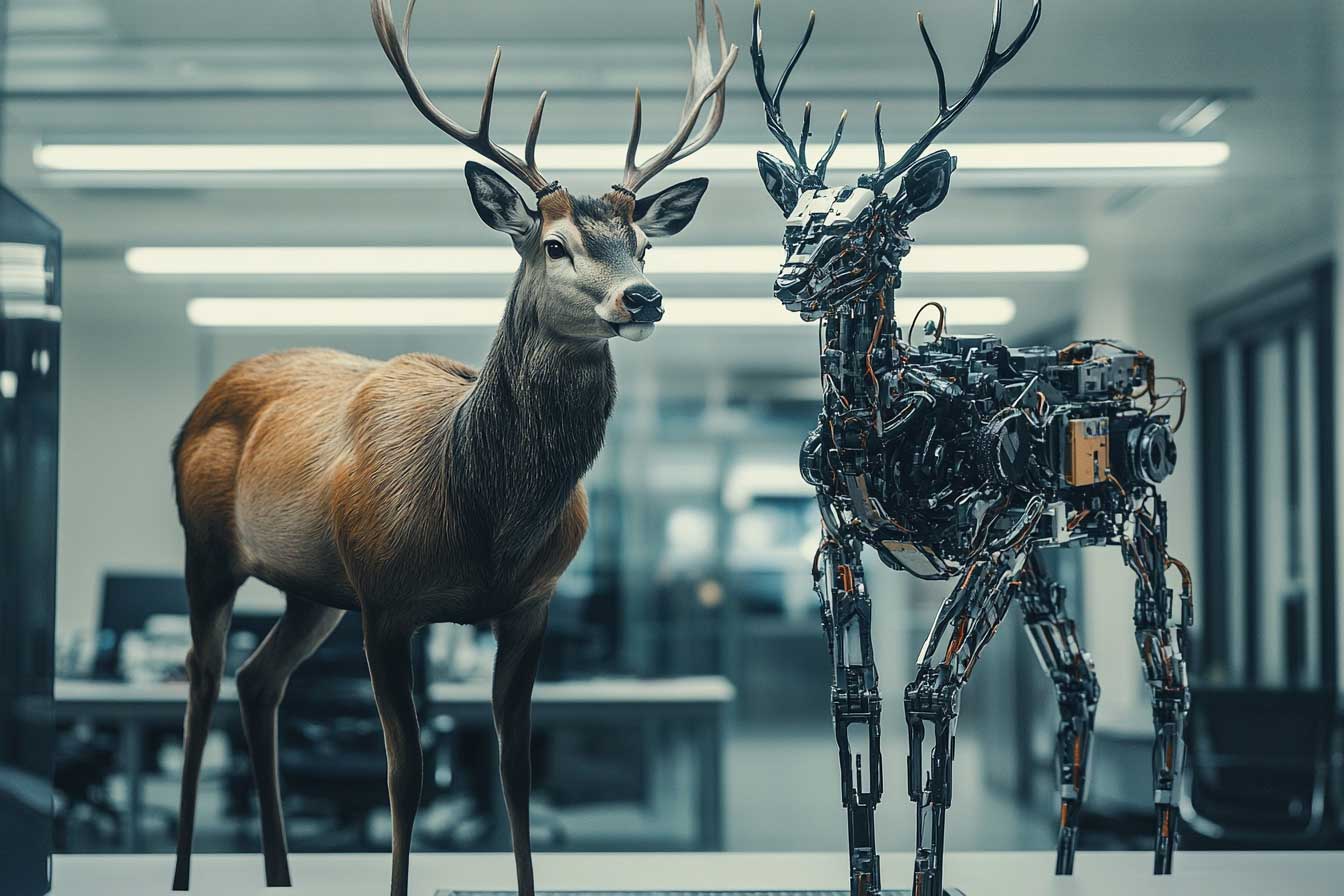Choosing Between AI Website Builders and Local Web Design Agencies
Why this article had to be written
There’s an influx of Businesses that are approaching local agencies to fix or migrate away from the agreements made to AI and DIY website builders.
"With the right choice, your website will not only represent your brand effectively but also support your business objectives in a competitive digital marketplace."
Listen to this Article:
You’re given a choice when it comes to building a website. On one hand, there are low-cost, AI-driven website builders that let you create a site quickly using ready-made templates. On the other hand, there are custom-designed websites built by local experts, offering a unique look and personalised features. This article explains both options in a clear, balanced way. It looks at some drawbacks of DIY AI platforms—like generic designs, limited customisation, and challenges with growth—while also showing how a custom-built site can offer better branding, strategic advice, and long-term value. By understanding these trade-offs, you’ll be able to make a well-informed decision that balances immediate cost savings with quality and future growth.
Quick Stats:
- 40% of businesses using AI website builders face customisation constraints and SEO challenges due to generic content generation (3) (5) .
- AI-generated sites often lack strategic vision, with 75% of websites built on rigid templates requiring post-launch adjustments (3) .
- 62% of businesses prefer agencies that combine AI tools with human oversight for tasks like branding, content strategy, and technical optimisation (1) (4).
- AI-built websites see 20% higher bounce rates than custom-designed sites, prompting businesses to seek UX/UI refinements (3).
- 67% of agencies observe clients requesting SEO overhauls for AI-generated content to avoid search engine penalties .
- 32.6% of businesses still opt for traditional web design to avoid AI limitations like copyright ambiguities and design homogeneity (1) (3).
When choosing between AI-generated websites from hosting providers and local web design agencies, small businesses and eCommerce ventures face trade-offs in cost, customisation, scalability, and long-term value. Business owners must choose between two main options:
- AI‐built websites provided by domain/hosting companies (like Shopify Magic, Hostinger’s Website Builder, Wix AI, or GoDaddy’s Airo)
- Custom websites developed by local web design agencies
This guide breaks down the advantages and disadvantages of each approach, helping you decide which option best suits your needs.
The Evolving Landscape
Traditional Website Building:
Once requiring coding skills or expensive professional services, platforms such as WordPress and Squarespace made DIY sites easier. Now, artificial intelligence is changing the game by generating complete websites in minutes. For example, Shopify’s AI tools help merchants automate tasks like product description creation, saving significant time (7).
AI Website Builders:
These platforms let you input basic details (industry, style, etc.) and automatically generate a site from pre–designed templates. They promise rapid deployment, low cost, and ease of use—even for those with no technical expertise.
Advantages of AI‐Built Websites
- Cost savings: Subscription models (e.g., £2.99–$24.99/month) eliminate upfront fees, making AI builders like Hostinger and Bookmark AiDA (2) (6)ideal for startups and businesses with tight budgets (1) (3).
- Rapid deployment: Fully functional websites can be built in hours using pre-designed templates and AI-generated content (1) (3).
- Built-in tools: Many platforms include SEO optimisation, multilingual support, and eCommerce features like tax calculators and inventory management (2) (6).
- Ease of use: No coding skills required, with drag-and-drop interfaces and automated design suggestions (1) (3).
Disadvantages of AI‐Built Websites
- Limited Customisation:
- Template Constraints: Pre–designed templates may lead to “cookie–cutter” websites that lack unique brand identity (4) (5).
- Reduced Creative Nuance: AI might not capture the subtle elements that differentiate your brand (4) (5).
- Advanced Functionality: AI struggles with advanced design tweaks, unique branding, or complex functionalities like custom APIs (4) (5).
- SEO limitations:
While basic SEO tools exist, they lack the depth of agency-led strategies for competitive niches (1) (6).
- Scalability & Complexity:
- Support & Strategic Guidance:
- Automated Help: Customer service is often via chatbots or FAQs, offering little personalised advice.
- Generic SEO Tools: Built–in SEO may not match the tailored strategies provided by experts.
Advantages of Local Web Design Agencies
- Bespoke, Custom–Tailored Designs:
- SEO expertise:
- Agencies provide targeted keyword strategies, content optimisation, and long-term SEO planning (6).
- Strategic Consultation & Personalised Service:
- In–Depth Discovery: Agencies conduct thorough consultations to align the website with your business goals.
- Ongoing Support: They offer maintenance, updates, and digital marketing advice over the long term. (1) (4).
- Face–to–Face Communication: Direct interaction leads to clearer, more effective design decisions.
- Enhanced Functionality & Scalability:
- Local Market Expertise:
- Regional Insights: Local agencies understand your market and can design sites that resonate with your target audience.
Disadvantages of Local Web Design Agencies
- Higher Upfront Costs:
- Longer Time-to-Market:
- Extended Development: The process—from discovery to launch—can take weeks or months.
- Multiple Revisions: Iterative feedback cycles may delay the final product.
- Communication Challenges:
- Misalignment Risks: Even with consultations, creative differences can lead to frustration and delays.
- Project Complexity: Coordinating among designers, developers, and marketers can complicate the process.
Key Comparison Factors
- Cost: AI platforms offer lower initial costs and predictable subscriptions, while local agencies require a higher investment but deliver custom, high–quality results.
- Time: AI solutions enable rapid launches; local agencies take longer due to detailed custom work.
- Customisation: AI sites use templates that may seem generic; agencies provide unique, tailored designs.
- Functionality: For basic needs, AI builders suffice; for complex features, custom solutions are preferable.
- Support: Local agencies provide personalised, ongoing support, whereas AI platforms generally offer automated help.
Comparison Table
| Factor | AI-Generated Websites | Local Agencies | Hertfordshire Web Design |
| Cost | £2.99–$24.99/month (2) (3) | £1,000+ upfront (1) (6) | £1,000+ Quotations, Charges and Payments: Hertfordshire Web Design’s Terms and Conditions |
| Time to Launch | Hours to days (1) (3) | Weeks to months (3) (5) | Weeks to months Hertfordshire Web Design’s Prices |
| Customisation | Limited to templates (4) (5) | Fully bespoke designs (5) (6) | Fully bespoke designs Hertfordshire Web Design’s Portfolio |
| SEO Capabilities | Basic optimisation (1) (6) | Advanced, strategic campaigns (6) | Hertfordshire Web Design’s SEO |
| Ecommerce Features | Automated tax/shipping, multilingual support (2) | Custom integrations, dynamic pricing (4) (5) | Hertfordshire Web Design’s eCommerce & Payment Integration |
| Long-Term Flexibility | Risk of platform lock-in (4) | Scalable, adaptable solutions (4) (6) | Room for Growth on; SEO, Speed, eCommerce, Design and Branding. |
Case Examples
Boutique Retailer:
- AI–Built: Fast launch with automated product pages, but design may lack distinctiveness.
- Agency–Built: Custom design with bespoke graphics and advanced eCommerce integration, though with higher costs and longer timelines.
Local Restaurant:
- AI–Built: Quick setup with reservation and ordering features, yet the design may not capture the restaurant’s unique ambiance.
- Agency–Built: A fully customised site that tells the restaurant’s story and integrates dynamic features, at the expense of time and cost.
eCommerce Business:
- AI–Built: An emerging online retailer opts for an AI website builder to set up a store quickly. The platform automatically generates product listings, integrates standard payment gateways, and provides basic SEO.
- Agency–Built: A growing eCommerce brand hires a local agency to develop a fully custom site with a unique visual identity, custom-coded shopping experiences, and advanced SEO and backend integrations for personalised product recommendations.
Future Trends & Hybrid Models
AI technology is rapidly evolving. Future AI website builders are expected to offer more granular customisation, real–time personalisation, and better integration with advanced tools. Many experts predict a hybrid approach where businesses initially use AI to launch a site and later work with an agency for refinement and strategic upgrades (8). This model combines speed and cost–efficiency with the creative expertise and ongoing support of human designers.
Conclusion
Choosing between an AI–built website and a custom solution from a local agency depends on your specific needs:
- For fast, affordable deployment: AI–built websites are ideal.
- For unique branding and complex functionality: A local web design agency offers a superior, bespoke solution.
- For many businesses: A hybrid model may provide the best of both worlds.
Evaluate your budget, timeline, customisation needs, and growth plans carefully. With the right choice, your website will not only represent your brand effectively but also support your business objectives in a competitive digital marketplace.
References
- https://mycodelesswebsite.com/ai-website-builders-statistics/
- https://www.hostinger.co.uk/tutorials/best-ecommerce-ai-website-builders
- https://www.sitekick.ai/blog/why-ai-is-revolutionizing-website-design-for-small-businesses
- https://www.vendasta.com/blog/website-builder-reseller/
- https://www.techradar.com/pro/website-building/5-downsides-of-using-an-ai-website-builder-how-to-overcome-them
- https://www.creativewebsols.com/the-benefits-of-ai-in-web-design-for-small-businesses/
- Shopify AI tools and efficiency improvements – reuters.com
- Comparison of traditional vs. AI website builders – dorik.com
This summary should help you quickly understand the trade-offs between AI–driven and custom website solutions while providing key research references for further reading.
Welcome to Hertfordshire Web Design's Audio Broadcast
Also, find us on:
#AIWebsiteBuilders, #LocalWebDesign, #CustomWebsiteDesign, #DIYWebsite, #WebDesign, #DigitalMarketing, #SEO, #UXDesign, #EcommerceDevelopment, #Branding, #WebsiteCustomisation, #RapidDeployment, #BespokeDesign, #HybridWebSolutions, #TechnicalOptimisation, #StrategicConsultation, #LocalExpertise, #BusinessGrowth, #AIDesign, #WebDevelopment
Frequently Asked Questions
If I start with an AI-built website, how difficult is it to migrate or upgrade to a custom-built solution as my business grows?
For clients considering starting with an AI-built website, migrating or upgrading to a custom-built solution later on can be a complex process. Often, AI platforms lock you into their own systems and design templates, meaning that a transition isn’t simply a matter of “tweaking” your current site. At Hertfordshire Web Design, we recommend planning for future growth from the outset. This may involve developing a roadmap that begins with an AI solution to launch quickly, then gradually re-platforming components as your business’s needs evolve. While it does require some redevelopment work, our team has extensive experience in managing smooth transitions to ensure your website remains robust and tailored to your brand as you expand.
Beyond the initial costs, what are the long-term return on investment and ongoing maintenance differences between AI website builders and local agency solutions?
When it comes to long-term return on investment and ongoing maintenance, AI website builders offer the appeal of low upfront costs and rapid deployment. However, as your business grows, you may encounter limitations in functionality and design flexibility that lead to increased expenses for updates, integrations, and even potential migration work. In contrast, investing in a custom-designed website from a local agency typically involves a higher initial investment, but it offers significant long-term benefits. A site built with a custom approach is easier to scale, adapt, and maintain with personalised support, which ultimately results in fewer unexpected costs and a higher overall return on your investment over time.
How do the security features and vulnerabilities compare between AI-generated sites and custom-designed websites, and what additional measures might be needed for each option?
Security is another critical factor where differences emerge. AI-generated sites usually include standard, one-size-fits-all security measures that may be sufficient for basic needs but can lack the depth of protection required for more complex business environments. Custom-designed websites, on the other hand, enable us to integrate bespoke security solutions—such as advanced firewalls, tailored encryption protocols, and regular, in-depth audits—that are aligned with your specific operational requirements. For an AI-built site, additional third-party monitoring and periodic security reviews might be necessary to ensure vulnerabilities are addressed. Our approach at Hertfordshire Web Design is to always build and maintain a secure online presence that protects both your business and your customers.






